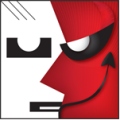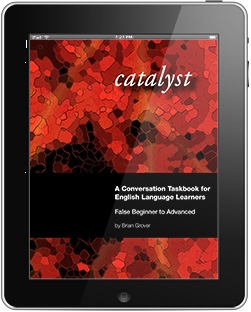
New iPad Coursebook Fuses Innovative ESL/EFL Pedagogy to “Multi-Touch” Environment
Brian Grover, Canada

Catalyst is a collection of firsts. Catalyst ESL Taskbook is the first and only, “multi-touch” ELT textbook made expressly for the iPad platform. Moreover, Catalyst is the first coursebook that integrates the acquisition of communication tactics into the syllabus. Catalyst is also the first oral English resource to employ a failsafe topic-creation mechanism. On top of all that, relevance, review and assessment are all built-in. Taken together, these features virtually eliminate teacher prep.
“The beauty of Catalyst,” says author Brian Grover, “is that conversational topics are created mechanically, on-the-fly by the students themselves. By generating topics this way, course content becomes more relevant and therefore provides a more effective tool for the acquisition of language.”
“If you’ve ever taught or observed conversation classes that were truly oral you’ll recall that messy little dance where instructors and students try to negotiate a topic for the day. Sometimes half the class is devoted to just getting started. Catalyst eliminates that whole process, resulting in significantly more efficient use of class time. Students are talking about meaningful things — things that mean something to them personally — in a matter of seconds. The whole point is to connect current learning with prior experience for a more robust paradigm of retention. Catalyst achieves that,” the author adds.
Grover says that the approach behind Catalyst ESL Taskbook came from a desire to elicit more spontaneity from students; to have less thinking, less translation, more response without invoking the ghost of BF Skinner.
“The responses had to be meaningful. Gradually I found a way to connect experience and anecdote with current learning almost instantaneously. And that’s the real magic of Catalyst, the reason students respond to it so well.”
Maximizing oral output is only one component of the Catalyst approach. “Just talking is fine as far as that goes,” Grover observes. “With Catalyst we’ve assigned double duty to the output, leveraging it for the acquisition of a broad range of communication tactics.”
Grover explains that tactics are highly idiomatic elements of communication and include active listening techniques, signposting strategies, supportive backchannel utterances, tangent and digression markers and a whole host of discourse markers. Through a series of graded tasks students learn entrance and exit strategies, mastering the smooth segue along with the abrupt shift, interruption techniques, hedges, intensifiers, verification, afterthought and more: 46 graded tactics altogether.
“The acquisition of tactics empowers language learners with finesse and control that extends well beyond the classroom walls,” Grover adds.
“These things are never taught in any kind of systematic way. Students are expected to pick them up somehow or communicate without them yet tactical elements are really the framework upon which conversation takes place. They are formulaic, highly idiomatic, sometimes even lack a semantic basis,” Grover continues. “How can we expect students to translate cognates from their own cultural and linguistic backgrounds when they may not even be fully aware of the tactical nature of these kinds of utterances in their native languages?”
While Catalyst: A Conversation Taskbook for English Language Learners is available in both digital and analog, the iPad version is creating the greatest stir.
Catalyst ESL Taskbookis the first and only interactive, “multi-touch” iBook designed for ELT. Since this is very new technology it is important not confuse the immersive learning experience created using Apple’s iBooks Author with the strictly linear approach of the typical ePub-style digital textbook. Multi-touch textbook technology was launched, without prior warning, by Apple in January 2012 and the educational publishing world is still scrambling to catch up. “Catalyst ESL Taskbook is already there,” Grover stresses. “We were the first out of the gate and we weren’t just porting some tired, shopworn approach over to a new platform. This is all new, this is unique and, most importantly, Catalyst is highly effective when it comes to programs with an oral emphasis.”
“Perhaps more than teachers, students are easily captivated by the technologies inherent in the iPad platform and the multi-touch experience,” Grover explains. “That attraction translates into heightened motivation and performance as a consequence.”
All four-skills are integral to the successful completion of learning tasks in Catalyst ESL Taskbook. The productive skills are emphasized, however, since learners typically have fewer opportunities to practice speaking and writing. Journal assignments are purposefully designed to consolidate spoken output and figure prominently in the assessment process as well.
In addition to instructor-centredjournal assessment, most lessons contain opportunities for self- and peer-assessment with reflective-style debriefing a regular occurrence. In programs that require grading, instructors will find it simple to use roll call to accumulate marks that can serve as the basis of grades.
To ensure learning targets are achieved and retained, a comprehensive regimen of “spaced-repetition” is built in.
For Further Information: Contact Brian Grover via email at brian@speekeezy.ca. Catalyst: A Conversation Taskbook for English Language Learners is published in Canada by Speekeezy Publication Workshop [www.speekeezy.ca] and is distributed in more than 50 countries through Apple’s iTunes and iBookstore. Samples for iPad are available through the Apple’s distribution network while editorial review copies are available by request.

Please check the Using Mobile Technology course at Pilgrims website.
Please check the ICT - Using Technology in the Classroom – Level 1 course at Pilgrims website.
Please check the ICT - Using Technology in the Classroom – Level 2 course at Pilgrims website.


|